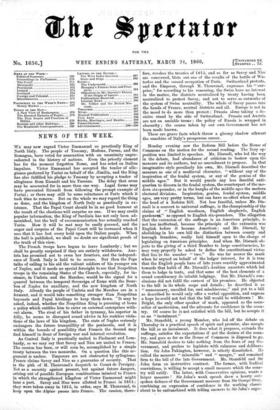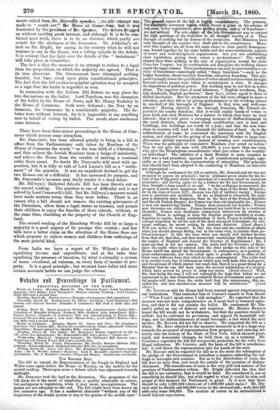North Italy. The people of Tuscany, Modena, Parma, and the
Commons on the motion for the second reading. The Tory op- Romagna, have voted for annexation with an unanimity unpre- position was limited to speeches. Mr. Disraeli, who led the way cedented in the history of nations. Even the priestly element in the debate, had abundance of criticism to bestow upon the has for the moment forgotten Rome, and has acted on Italian measure and its authors but no amendment to propose. In that impulses. Victor Emmanuel has accepted the tender of alle- imaginative style peculiarly his own, Mr. Disraeli described the
ments culled from Mr. Disraeli's speeches. An idle attempt was made to " count out" the House at dinner-time, but it was frustrated by the prudence of Mr. Speaker. The debate dragged on without exciting great interest, and although it is to be con- tinued next week, there is to be no division, which partly ac- counts for the slackness of the discussion. Mr. Adderley's at- tack on Mr. Bright, for saying in the country what he will not venture to say in the House, was a telling episode in the debate. It is evident that the fight over the details of the " instalment " will take place in Committee. • The fact is that the measure is an attempt to reduce to a legal form the propositions on which the majority are agreed. That is its true character. The Government have attempted nothing fanciful, but have stood upon plain constitutional principles. The fact that the bill excites no popular agitation may be accepted as a sign that the battle is regarded as won.
In connexion with the Reform Bill Debate we may place the two discussions on the ballot. Lord Teynhara. was the champion of the ballot in the House of Peers, and Mr. Henry Berkeley in the House of Commons. Both were defeated ; the Peer by an immense, the Commoner by a considerable majority. The de- bates were without interest, for it is impossible to say anything new in behalf of voting by ballot. The result alone awakened some interest.



























